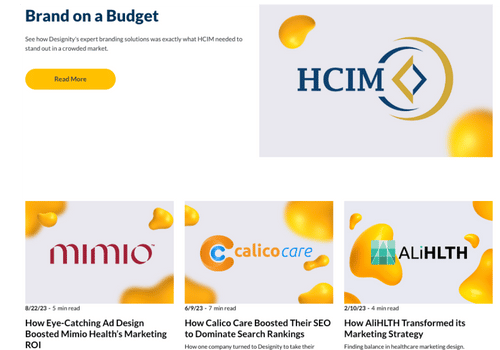The Value of B2B Case Studies on Websites
B2B marketing is super competitive which makes establishing trust and credibility is paramount. One powerful tool that can help achieve this is B2B case studies featured on a business website. Case studies offer an in-depth look at how your products or services have benefited real customers, providing tangible proof of your value. Here’s why incorporating case studies into your B2B website can be a game-changer.
The one KPI that all B2B marketers strive for is leads. Website-generated leads and conversions aren't easily earned without trust and credibility. A strong case study on a website can make the difference between a bounce and a conversion.
See our B2B SEO Content Library.
Such as:
“A strong case study on a website can make the difference between a bounce and a conversion.”
Table of Contents Show
See Our Case Studies
High-quality case studies, testimonials, and reviews play a crucial role in our marketing success.
8 Reasons Why B2B Case Studies are Awesome:
1. Showcases Real-World Success
Case studies for marketing highlight real-world applications and successes of your products or services. They provide detailed narratives that potential clients can relate to, demonstrating how you’ve solved specific problems and delivered measurable results. This concrete evidence helps to build trust and confidence in your offerings.
“73% of B2B marketers use case studies because they see significant improvements in lead generation and overall engagement by showcasing real-world applications and successes.”
2. Builds Credibility and Authority
A well-crafted case study positions your business as an expert in your field. By showcasing your ability to deliver results, you enhance your credibility and establish authority. This is especially important in the B2B space, where decision-makers are looking for reliable partners who can provide proven solutions.
“84% of B2B marketers report that case studies help build brand awareness and establish authority in their respective fields.”
3. Drives Engagement and Conversions
Engaging content is key to capturing the attention of potential clients. Case studies are compelling stories that draw readers in and keep them engaged. They provide a narrative that is often more persuasive than traditional marketing materials, leading to higher conversion rates. Readers who see their own challenges reflected in your case studies are more likely to trust your solutions and take action.
“72% of marketers say that content marketing, including case studies, increases engagement, and 72% of business leaders report that it increases their number of leads.”
4. Enhances SEO
Case studies are a treasure trove of SEO benefits. They often include industry-specific keywords and phrases that potential clients are searching for, improving your website’s search engine rankings. Additionally, high-quality case studies can attract backlinks from other reputable sites, further boosting your SEO efforts.
“91% of B2B marketers use content marketing, including case studies, to reach customers, which helps in improving search engine rankings and overall visibility. ”
5. Provides Valuable Insights
Case studies offer deep insights into how your products or services are used in real scenarios. They highlight the challenges faced by your clients and how your solutions have addressed these challenges. This not only informs potential clients but also provides valuable feedback that can guide your future product development and marketing strategies.
“55% of B2B buyers rely more on content to make purchasing decisions than they did in previous years, indicating the growing importance of detailed insights provided by case studies.”
6. Supports the Sales Process
Sales teams can leverage case studies as powerful tools during the sales process. They provide concrete examples and success stories that can help persuade potential clients. By showing how similar companies have benefited from your solutions, you make a compelling case for why new clients should choose your business.
“67% of B2B content teams create top-of-the-funnel content, such as case studies, most often to aid the sales process and engage potential leads effectively. ”
7. Fosters Customer Relationships
Involving your clients in the creation of case studies can strengthen your relationship with them. It demonstrates that you value their success and are proud to showcase their achievements. This collaborative effort can lead to more loyal customers and potentially more referrals.
“89% of B2B marketers find that customer stories, including case studies, help in building trust and loyalty, leading to stronger customer relationships.”
8. Differentiates Your Brand
In a crowded marketplace, differentiation is key. Case studies set you apart by highlighting unique aspects of your solutions and your ability to deliver results. They show that you are not just another vendor, but a partner who can make a real difference for your clients.
“79% of very successful content marketers allocate more than 10% of their total marketing budget to content, such as case studies, to differentiate their brand and demonstrate their unique value proposition. ”
More Statistics About B2B Case Studies on Websites:
Boosts Lead Conversion Rates:
73% of B2B marketers use lead conversions as a key performance metric, with case studies significantly contributing to higher conversion rates.
Source: Backlinko
Improves Customer Understanding and Trust:
90% of prospects are influenced by positive reviews and case studies when making purchasing decisions, showcasing the impact of trust and reliability.
Source: Levitate Media
Higher Content Marketing ROI:
72% of B2B marketers report that content marketing, including case studies, delivers a higher ROI than traditional marketing efforts.
Source: Content Marketing Institute
Drives Organic Traffic:
55% of B2B buyers rely more on content to make purchasing decisions, indicating that well-crafted case studies can drive significant organic traffic to your site.
Source: Expert Market
Enhances Content Relevance:
67% of B2B content teams prioritize creating top-of-the-funnel content like B2B case studies to ensure relevance and alignment with their audience's needs.
Source: Databox
Supports Long Sales Cycles:
69% of companies plan to increase their content marketing budget, including case studies, to better support the long sales cycles typical in B2B transactions.
Source: Expert Market
Facilitates Informed Decision-Making:
91% of B2B marketers use content marketing, including case studies for marketing, to educate and inform their audience, helping them make better purchasing decisions.
Source: Expert Market
Provides Social Proof:
88% of people trust online reviews and case studies as much as personal recommendations, providing strong social proof that can influence buying decisions.
Source: BrightLocal
These additional statistics further demonstrate the powerful impact case studies have on various aspects of B2B marketing and website performance, from improving lead conversions and driving organic traffic to enhancing customer trust and supporting long sales cycles.
How Do Case Studies Help with SEO?
“Case Studies act as a resilience booster. They significantly increase dwell-time, reducing bounce rates and improving website authority in the eyes of search engines.”
Case studies can significantly enhance your B2B SEO efforts in several powerful ways:
Keyword Integration: Case studies naturally incorporate industry-specific keywords and phrases that potential clients are searching for. This strategic use of keywords improves your website's visibility on search engines.
Long-Form Content: Search engines favor long-form content, and case studies typically provide detailed, comprehensive information. This depth not only improves your rankings but also establishes your site as a valuable resource.
Backlinks: High-quality case studies can attract backlinks from other reputable websites, which are crucial for improving domain authority and search engine rankings. These backlinks act as endorsements, boosting your site's credibility.
User-Generated Content: Case studies often include testimonials and quotes from real customers, adding authentic, user-generated content to your site. This content enhances trust and credibility while positively impacting SEO.
Fresh Content: Regularly updating your website with new case studies keeps your content fresh and relevant. Fresh content signals to search engines that your site is active and up-to-date, which can positively impact your SEO.
Engaging Content: Case studies are compelling narratives that draw readers in. By presenting real-world success stories and organizing them by industry, Ideal Customer Profile (ICP), and product/service solutions, you create engaging content that captures and retains the attention of your audience, improving engagement metrics such as longer page visits and lower bounce rates. These positive signals are rewarded by search engines, enhancing your site's ranking.
How to Create Effective Case Studies
“An effective case study on a B2B website needs to be both engaging and informative, providing a clear narrative of how your business has positively impacted a client. Start by selecting a client who has achieved significant results with your product or service. This client should be willing to provide detailed feedback and testimonials, as their endorsement can add substantial weight to your case study.”
To maximize the value of case studies, ensure they are well-crafted and targeted by following these key steps:
Asking Strategy: Develop a thoughtful approach to request case study participation from clients. Identify satisfied customers who have experienced significant success with your product or service. Clearly communicate the benefits for them, such as increased visibility and the opportunity to showcase their success story.
Prove That It's Real: Enhance credibility by including elements that prove the authenticity of your case study. Use video testimonials from clients or leverage trusted third-party platforms for validation. This adds a layer of trust and reliability.
Focus on Real Results: Highlight specific metrics and outcomes that demonstrate your success. Use quantifiable data to provide clear evidence of the impact your solution had on the client's business.
Tell a Compelling Story: Structure your case studies with a clear beginning, middle, and end. Focus on the client’s journey, the challenges they faced, and the impact of your solution. This narrative approach makes the case study more relatable and engaging.
Include Client Quotes: Direct quotes from your clients add authenticity and credibility. These testimonials provide a first-hand account of the client's experience and satisfaction with your product or service.
Use Visuals: Incorporate images, charts, and other visuals to make the case study more engaging and easier to digest. Visual aids help to break up the text and illustrate key points effectively.
Keep It Relevant: Tailor your case studies to the specific industries and challenges of your target audience. Ensure the content resonates with the reader by addressing issues that are directly relevant to their business context.
By incorporating these elements, you can create compelling case studies that not only showcase your successes but also build trust and credibility with potential clients.
Need Some B2B Case Studies for Marketing Inspiration?
Here are 5 sites we recommend:
1. Designity
2. Net Health
3. Hubspot
4. FRACTL
5. Shepper
Conclusion
B2B case studies are invaluable assets for B2B websites. Case studies for marketing build trust, enhance credibility, drive engagement, and support your overall marketing and sales efforts. By showcasing real-world success stories, you provide potential clients with the proof they need to choose your solutions over the competition. If you haven’t yet leveraged the power of case studies, now is the time to start.
Need help with SEO? Ask us at SpearPoint Marketing.














